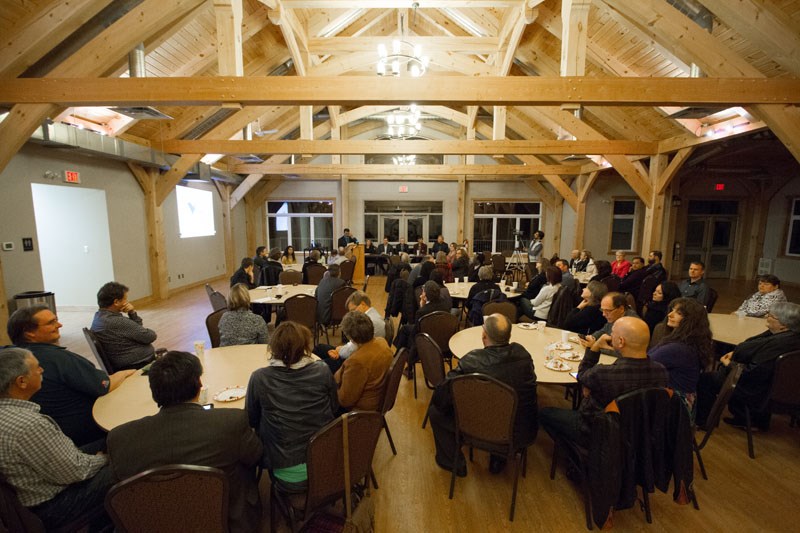The Thompson Chamber of Commerce celebrated Northern Business Week Oct. 17-21, hosting vice-president of Vale Manitoba Operations Mark Scott, Nisichawayasihk Cree Nation Chief Marcel Moody and Thompson Progressive Conservative MLA Kelly Bindle at Riverlodge Place Oct. 20 to provide an update on the state of commerce in Northern Manitoba.
Vale’s update on the current economic situation was bittersweet, as Manitoba Operations’ successes over the last few years are largely a matter of survival; however, in the current commodities market, Scott stressed that survival was an achievement to celebrate. With the cost of nickel at historical lows relative to the cost of production, Scott noted that the Thompson mine has only survived due to a dramatically reduced cost of production. Expenditures in Canadian dollars (Manitoba Operations’ primary currency) were reduced by 25 per cent, and expenditures in U.S. dollars reduced by 45 per cent.
“We’ve gone from the third to the fourth quartile of the market,” Scott noted. “Which meant that we wouldn’t be able to operate over the last year, or today, had we not realized the success of the last five years.”
Despite the cuts in operational spending, Scott notes that capital investment in the facility has never been higher, due in part to Vale’s extensive resource base. “We’re a small part of a very large operation; the Thompson organization represents a little less than two per cent of that large enterprise.”
Capital investments slated for the coming years include the dewatering facility required to render concentrate shippable (an $80 million project), and an extension to Dam B of the tailings management area to accommodate a greater amount of material for future excavation (at a cost of $30 million). Investments have been made into expansion into new, viable resource bodies through exploratory diamond drilling.
Scott also noted that profit margins on the new concentrate export will be comparable to that of the refined product exported in the past: while the new concentrate is only worth 70 per cent as much as the refined product by weight of nickel content, smelting and refining constituted 30 per cent of the refined product’s input costs.
Roughly 500 positions directly paid by Vale will be eliminated due to the smelter and refinery closures, though 300 of the people currently staffing these positions will be eligible for retirement around the time of closure. Otherwise, Scott insisted that Vale was prepared to assist employers in the community “to find a new home for a number of trained and skilled industrial employees that are ready and willing to work in any number of other occupations.”
In response to a question from the audience, however, Scott assured that the firm would do everything in its power to retain skilled tradesman. “I have no interest in seeing them go anywhere else.”
Moody also made a brief presentation to the hall, updating attendees on NCN’s activities since the approval of the Mystery Lake urban reserve, and the improvements slated for the community of Nelson House in the coming years.
Moody projected the Mystery Lake property to be fully developed within two years, with an investment of up to $20 million. No concrete plans to proceed have been laid. “We want to be in Thompson to compete and offer services that people need, and take our rightful place in the community.” He did emphatically state, however, that a casino is not part of those development plans.
The community of Nelson House recently saw the opening of a new $3.5 million grocery store employing 16 individuals; Moody noted that the community was due for several more improvements, including a $6 million recreational complex, a new school, and is next in line to receive funding for a new nursing station. Moody also noted that the community was seeking to upgrade its current sewage system.
The final speaker of the evening, Bindle was present to reassure the chamber and its partners that the Progressive Conservative government was committed to encouraging economic development in the north. Bindle stressed the need for economic diversification in the region, citing the community of Yellowknife as an example. A former mining community, Bindle holds Yellowknife up as a shining example of what Thompson could become if it utilizes its tourism resources effectively. “It’s in the north, it’s in the middle of nowhere, they don’t even have polar bears. But they have a wide diversity of services geared towards tourism.”
In broadest strokes, the PC government’s primary agenda is to reduce barriers to investment from outside of the province, and create an environment where entrepreneurs are confident in their ability to create a successful venture within.
Nor has the PC government abandoned natural resources in Manitoba: perhaps the most exciting news that Bindle brought to chamber guests was the renewed interest in the Lynn Lake mining site for renewed gold extraction. “They’re adamant about hiring northerners, and it rarely happens that you find new resource fields in a place where there’s already infrastructure, communications, and a community set up for it.”
Bindle noted that the province has been heavily involved in both managing the Tolko paper mill closure and the possible sale of the Port of Churchill. However, Bindle noted that an international economy meant that the Manitoban economy could not depend on a handful of resource industries to keep the province afloat. “We need entrepreneurs to make the investment and take the risk,” he said. “Our government is not going to use taxpayer money for temporary solutions to buy time before the next election.”
Bindle also stressed that all-weather roads and improvement of existing roads were priorities for the PC government. However, he did say that years of neglect have driven repair costs to astronomical heights, and construction priorities have yet to be established.




